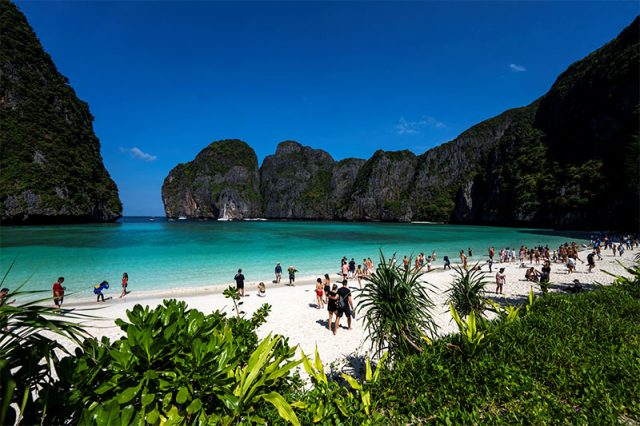
BANGKOK— When 23-year-old Norwegian Anastasia Johansen and her boyfriend were planning their first vacation in two years, they considered going to Thailand but chose nearby Vietnam instead, for its simpler entry rules on the coronavirus.
“The regulations to enter Thailand … were complicated to me and we had to pay for the hefty PCR test,” Johansen said.
Thailand, one of the world’s tourism destinations before the pandemic, was among the first nations in Asia to reopen its borders to vaccinated visitors last year with limited quarantine norms, hailed at the time as a model for re-opening.
But as regional peers have eased entry requirements, Thailand has clung to a cumbersome process.
“Whichever (country) offers easy, smooth, less complicated procedures wins my heart,” said Johansen.
Tourism professionals say Thailand’s complicated entry rules are now holding back recovery in an industry that contributed 12% of GDP before the pandemic.
Forward bookings for 2022 show Thailand reaching 25% of pre-pandemic levels, behind levels of 72% and 65% each for Singapore and the Philippines.
Many blame the Thailand Pass pre-entry approval system, which can take up to seven days, although the government recently vowed to streamline it.
“The red tape is killing us,” said Bill Barnett, the managing director of hospitality consultancy C9 Hotelworks.
“If you’re in Singapore and want to come to Thailand for the weekend, it’s not easy. Those short-term trips matter.”
American Kiran Stallone, who is visiting family in Thailand, said getting the Thailand Pass required proof of vaccination, insurance coverage of at least $20,000 and reservations at a qualified hotel, all submitted on a Thai government website.
“The government website was hard to navigate, and I had to seek outside help,” Stallone added.
Stallone said she was told to avoid some steps known to cause submission glitches that would delay her application.
The website does not allow users to save progress or return to previous pages and rejects PDF files.
A Facebook group on the Thailand Pass has ballooned to 90,000 members, with would-be travelers asking anxious questions about changing flights, new entry rules and some venting frustration over rejected applications.
Similar forums have also emerged on sites such as TripAdvisor.
You shall not pass
Thailand received 39.9 million visitors in 2019 when Bangkok, the capital, was named the world’s most visited city.
That year, Singapore and the Philippines recorded 19.1 million and 8.26 million arrivals respectively.
Thailand aims to attract 5 million to 10 million visitors this year, but critics call its Thailand Pass system an unnecessary obstacle.
“It’s uncompetitive for Thailand and complicated for travelers… who lose all flexibility,” hotel tycoon William Heinecke, chairman of Minor International Pcl MINT.BK, told Reuters.
An approved Thailand Pass can only be used one week before or after the date indicated.
The tourism council also said the system’s requirement of individually filed documentation made it tougher for tour operators to bring in groups.
Thailand’s coronavirus taskforce spokesperson, Taweesin Visanuyothin, said tourist arrivals have been increasing as measures were relaxed and recognized that domestic infections outnumbered those from abroad.
However, Thailand’s staggered approach to relaxing the rules has also caused confusion.
Entry for vaccinated tourists with limited quarantine resumed in February after a brief suspension over the Omicron variant.
At the time, travelers had to take at least three COVID-19 polymerase chain reaction (PCR) tests; one each before departure, on arrival and on the fifth day of their stay.
In March, that final test was replaced with a rapid antigen test and insurance coverage was dropped to $20,000 from $50,000. In April, the pre-departure PCR test was scrapped.
From next month, insurance of $10,000 is required but tests for vaccinated travelers and advance hotel bookings have been dropped.
—Reporting by Chayut Setboonsarng; Additional reporting by Phuong Nguyen in Hanoi; Editing by Clarence Fernandez









